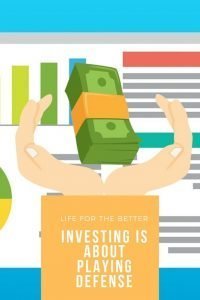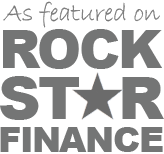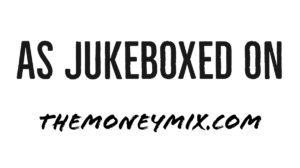Author Bio: RJ Schulte is a CPA, FI/RE enthusiast, and personal finance blogger at Cash Confident. He focuses on exposing misinformation in the financial world and putting finance into plain English so his readers can achieve early financial independence.
This article is not intended to provide specific tax or legal advice. RJ Schulte does not give tax or legal advice. You are encouraged to consult with your tax advisor concerning your own situation.
Investing Is About Playing Defense
 The world of investing revolves almost entirely around speculation. Most investment advice provides information about an investment that will ultimately have an unpredictable outcome. Turn on CNBC and you will find analysts debating stock valuation. Open up the business section of a newspaper and you will read about the latest investing trends or some hyped-up IPO.
The world of investing revolves almost entirely around speculation. Most investment advice provides information about an investment that will ultimately have an unpredictable outcome. Turn on CNBC and you will find analysts debating stock valuation. Open up the business section of a newspaper and you will read about the latest investing trends or some hyped-up IPO.
Money-oriented people spend countless hours trying to pick winning investments. However, the overwhelming majority of active investors underperform the market. If they are the lucky few who succeed, their success will likely be by a small margin, perhaps 1-2% over a period of decades.
People obsess over this slim margin but often neglect the most powerful factor in the world of investing: taxes.
Allow me to explain.
Take a high-income earner in the United States. His income is taxed in the following way:
Federal: 37.00%
State: 5.00%
FICA: 7.65%
Total = 49.65%
Half of his income is eaten away by taxes before even factoring in dividends, capital gains, etc.
Taxes are a guarantee. To an extent, they are in your control.
But all too often people purchase investments that are housed in taxable accounts before maxing out tax-advantaged accounts. Millions of investors are willing to pay the maximum amount of taxes so they can bet on the latest IPO or gamble on the latest cryptocurrency. They obsess over the 1% and neglect the 50%.
Say your total tax rate is 35%. Are the gains on your investments really going to outweigh the 35% tax you are willing to pay to invest in them?
Probably not.
Sensible investors play defense, not offense. They inform themselves of tax implications and implement strategies to minimize the burden of taxes.
Below are five ways to reduce the impact of taxes on your investments.
-
Max Out Tax-Advantaged Accounts
The easiest and most straightforward way to avoid taxes is simply to invest your money through tax-advantaged accounts.
Some of these accounts are superior to their counterparts. It is in your best interest to contribute to investment accounts in the following order.
- 401(k) company match
- Health Savings Account
- Individual Retirement Account
- Remaining 401(k)
- Taxable accounts
See why it is important to invest in this particular order called the golden sequence of investing.
-
Place Tax-Efficient Assets in Taxable Accounts
Certain investments have a heavier tax-burden than others.
Bonds, for instance, are very tax-inefficient investments. Essentially, the income you receive from bonds is interest income. This interest income is taxed at your highest marginal rate. So, if you are in the 32% income bracket, your interest will be taxed at 32%.
Compare this to stock index funds. Index funds are tax-efficient for three main reasons:
- They provide you income in the form of dividends. Dividends are generally taxed at a lower rate than interest income.
- Index funds usually pay fewer dividends than individual stocks.
- They have low turnover, meaning the stocks in the fund are not sold very often. Selling a stock creates a capital gain, which you have to pay tax on.
Below is a list of investment classes from the most tax-efficient to the least tax-efficient. The list does not include every asset class, but provides a general guideline when selecting which investments to place in taxable accounts.
- Cash
- Stock index funds
- Tax-managed funds
- Low-yield bonds
- Active stock funds
- REITs
- High-yield bonds
-
Purchase Stocks That Pay Qualified Dividends
Dividends can be either qualified or nonqualified. Qualified dividends are taxed at either a 0%, 15%, or 20% rate. Nonqualified dividends are taxed at higher rates.
In general, dividends paid by large US corporations are qualified.
If you are investing in a mutual fund you can check with the mutual fund company to determine whether the companies they invest in pay qualified dividends.
Keep investments that paid qualified dividends in taxable accounts. Harbor investments that pay nonqualified dividends in tax-advantaged accounts.
-
Hold Stocks More Than A Year
You pay tax when you sell a stock for more than you paid for. This is known as a capital gain. There are two types of capital gains:
- Short-Term Capital Gains
- Long-Term Capital Gains
Short-term capital gains occur on investments held for a year or less and they are subject to a higher tax rate. Like nonqualified dividends, short-term capital gains are considered ordinary income (the same type of income as your wages) and are taxed at your highest marginal tax rate.
If you hold an investment for more than a year before selling, you will have a long-term capital gain. These are taxed at a lower rate than short-term capital gains. You will have to pay a maximum of 20% tax.
-
Tax Loss Harvesting
If you have a losing investment that you want to get rid of, you can sell the investment at a loss and offset your capital gains.
For instance, say you purchase and investment for $20,000 and sell it for $10,000. You will have a $10,000 capital loss.
You also have an investment that you paid $25,000 and sell for $30,000. You will have a $5,000 capital gain.
The $10,000 capital loss can be used to offset your $5,000 capital gain. Of the $5,000 remaining capital loss, $3,000 can be deducted on your tax return and the remaining $2,000 can be carried forward to future years.
Play Defense
Taxes will play the biggest role on your returns over the course of your investment period. The most optimal strategy to grow your wealth is not to spend time playing offense for the 1-2%. It’s about playing defense against taxes that can eat away at your investments year after year.
We use Personal Capital to track our net worth. We simply connect our assets and it tracks everything for us! Our net worth, cash flow, budget, investment fees, retirement planner, and more are tracked through this site. It’s completely free too! Sign up for free and receive $20 when you open an account!








